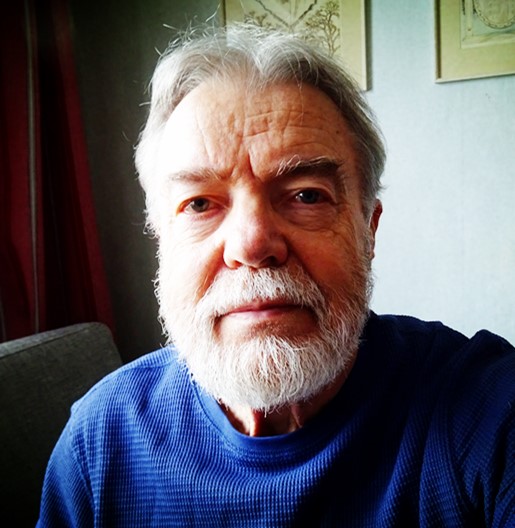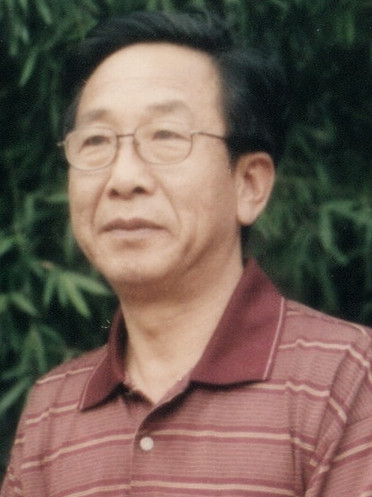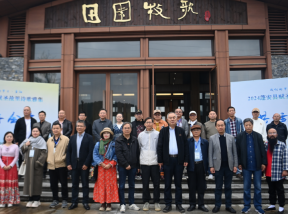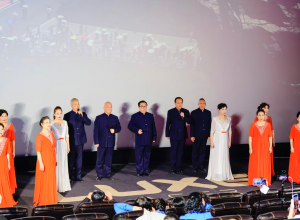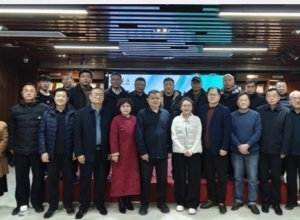|
尤里·塔尔韦特诗选(三) 杨宗泽编译
Selected Poems of JÜRI TALVET (Set Three) Compiledand translated by Yang Zongze
蜿蜒曲折的葡萄牙语单词
葡萄牙语词汇蜿蜒曲折, 潜入那些隧道之中, 那里空气仿佛即将耗尽,黑暗的 墙壁将它们挤压在一起。但是 随后,突然从里斯本的七座山丘间 蹿出一辆小小的黄色有轨电车,兴高采烈, 却又带着一百种凝重的神情, 从车窗向外凝视着(此刻,我那 年迈瘦小的母亲在家里,在她的床罩下 翻了个身。黑夜啊,你为何不帮我合上双眼?) “法多(Fado)”意味着命运:字母“O”变成了 一个低头丧气的“U”。 但这里并没有无尽的黑暗—— 相反,从隆冬里 传来西贝柳斯忧伤的圆舞曲。 并非所有的悲伤都以“法多”作结, “全部”并不能穷尽“总体”的含义。 在第五帝国之前, 还有第六帝国。费尔南多·佩索阿 就是那个时代的诗人,只是那时他的名字 叫若昂·阿雷亚,或者用我们的 方言来说,叫尤汉·利夫。
Portuguese Words Twist
Portuguese words twist dive into tunnels inwhich the air seems to runout dark walls force themtogether But then suddenly from theseven throats of Lisbonleaps a tiny yellowstreetcar cheerful but with a hundredgrave expressions gazing from itswindows (Just now my tiny old mother turnedat home under her bedcoversNight why don’t you close myeyelids?) Fado means fate: O becomes a U that hangs headdown But there is no deepdarkness – instead from deepwinter Sibelius’s sad waltzsounds Not all sadness endsin fado Todo doesn’t exhaust totality Before the fifthempire there was the sixthone There too Fernando Pessoa livedand wrote poems but hisname was João Areia or inour dialect Juhan Liiv
一把黑色雨伞
她大概二十五到三十岁之间。就外表来看,她的每一个动作 都把自由和泥泞混在了一起。这就是她紧张的原因。 她脱下皮夹克,背心下显露出 丰满的胸部,在她裸露而健美的手臂上 有纹身的花朵。她从牛仔裤口袋里 掏出药片,扔进嘴里。 她注意到旁边座位上有水渍,犹豫了 片刻,她用黑色围巾把它擦干, 接着把围巾扔到座位下面她的包上。她舒舒服服地 占了两个座位,翻开一本封面印着约翰·列侬的书, 一边读一边保持着想要与人分享的微笑。 她是混血儿,可能有阿拉伯血统,她黑发蓬松 随意地散开,额头高高。她从 夹克胸前的口袋里拿出一支香烟,但不知为何 又放了回去。她的肤色均匀而有光泽。 这时,她站起身来,手握一根 锃亮的金属杆,仿佛在拉大提琴。她又坐了下来, 嘴里默念着“昨天,爱情是一场 如此轻松的游戏”。根须在神秘莫测的 美国蔓延开来。接着,舞台被一件黑色方格外套 笼罩,没有任何选择,在两条裤腿之间,一个黑色公文包 稳稳地立在地铁车厢的铁地板上, 在它的提手之间,一把黑色的雨伞温顺地 靠在那里。
A Black Umbrella
She must be between 25and 30 For now every choice mixes freedom with mudThat’s why she’s nervous She takes off herleather jacket and her tanktop shows strong breasts and onher naked athletic arms tattooed flowers Shegrabs pills from a pocket of her jeans andtosses them into her mouth She notices the puddleon the next seat hesitates for a moment thendries it with her black scarf and throws the scarfon her bag under the seat She sits comfortably on twoseats opens a book with John Lennon on its cover and whilereading keeps the smile that she tries to share Mixedrace she could be Arab her black hair teased free a highforehead She takes from her jacket’s breastpocket a cigarette but doesn’t know why and replaces it Anevenly matte complexion Meanwhile she standsup wraps her fingers around a shining metal bar toplay cello She sits down again and with her mouthshapes the words Yesterday love was such an easy game to play Roots spreadthrough uncanny America Then the stage is darkened by a black squarecoat without choices between two trouser legs a blackbriefcase takes root on the iron floor of the subway car between its handles a passive black umbrella rests without any resistance
一位不知名的艺术家
一位不知名的艺术家,其签名 在林荫大道的街角处——不一定 非得在巴黎——要是放大来看, 或许能读出是“C.卡莫”。 他描绘了六个走过的人,他们经过 咖啡馆或商店橱窗上奢华的条纹遮阳篷, 天晓得为什么, 画成了四个细腿的年轻女子。 她们的腿宛如娇艳的花朵, 均匀地“种”在早春 或早秋的靴子里。即便在 华盛顿堡大街最密集的那排屋子, 太阳也找到了一道缝隙,悄悄窥探, 想要寻到那些年轻女子的腿, 在她们腿上“弹奏钢琴”。也许其中一位 是乔安娜,她从未去过 欧洲,也永远不会有机会 到那儿旅行。这把钥匙不听话, 只要地球母亲的脑海中 还敲打着这样的执念: 如何找到一份工作来养活 她的美国孩子们, 这两条腿就无法挪动去跳舞。
An Unknown Artist An unknown artistwhose signature on the boulevardcorner that need not necessarily be inParis if magnified might perhaps read CCamot has made of sixpersons who walk past lavishly stripedawnings over café or shop windows whoknows why four slender-leggedyoung women whose legs are likenice flowers evenly planted inboots of an early spring or an early autumn TheSun that even in the dense row houses onFort Washington Street has discovered a slitpeeps in to find the legs ofthe young women plays piano on themMaybe one of them is Joanna who hasnever been to Europe and willnever get the chance to travel there Thiskey disobeys these two legs cannotbe uprooted for a dance as long asthere drums in the earth mother’shead this obsession: how to find a job tokeep her American childrenfed
在亡者的领地里,我总能交到朋友
说实话——我真不明白,你说过 你的儿子在美国成了一位著名科学家, 但现在看来, 在他离家的那些年里,他什么都没做, 只是在纽约地铁里抓老鼠, 抓来给实验室的猫吃。而在笛卡尔看来, 猫是没有灵魂的。 至于我,我给詹姆斯·梅里尔写了一封信, 感谢他的《实验诗》, 我在纽约翻译这首诗的时候, 细雨从黎明一直下到黄昏。 (就连雨也是有灵魂的。) 在亡者的领地里, 我总能交到朋友。
I Will always Win Friends in the Land of the Dead .
HONESTLY – I DON’T GETIT. YOUR SON you said had become afamous scientist in America, but now itappears that in all thoseyears of absence he hasn’t done anything exceptcatch rats in the New Yorksubway, for lab cats who in Descartes’opinion have no soul As for me, I send aletter to James Merrill withthanks for “Laboratory Poem” which Itranslated in New York, in drizzle that fellfrom dawn to dusk. (Even rain has asoul.) In the land of the dead I willalways win friends.
无尽的吻
你总是会落下一些东西。 发现时, 却为时已晚! 仿佛你在匆匆忙忙地 赶一趟通往永生的航班。 仿佛你曾留下了 一个永不停息的吻—— 嘴唇贴着嘴唇!
A Never Ending Kiss
ALWAYS YOU LEAVE something behind. It’s always late! As if you hurried to a flight bound for eternal life. As if you had left behind a kiss that never ends – lips to lips!
file:///C:/Users/ADMINI~1/AppData/Local/Temp/msohtml1/01/clip_image002.jpg
[作者简介]尤里·塔尔韦特(JÜRITALVET):爱沙尼亚当代著名诗人、作家、翻译家、学者。1981年获圣彼得堡大学西班牙语哲学博士学位,1996年以来,在教学之余一直致力于一本比较文学杂志《国际文学》的编辑工作;1994到2010年间,曾任爱沙尼亚国际比较文学协会会长,1992年以来,尤里·塔尔韦特一直在爱沙尼亚塔尔图大学任世界担任文学教授,系国际比较文学协会执委,2016年当选欧洲科学院院士。其诗歌、散文和哲学著述被翻译为英语、汉语、西班牙语、法语、加泰罗尼亚语、罗马尼亚语和意大利语等十多种语言发表或出版,作品在国内外多次获得奖项。已有诗集、散文集、哲学论述集和翻译著作三十余部在国内外出版,其主要著作有《醒》(诗集),《来自梦,来自雪》(诗集),和《而爱,照亮我们》(诗集),《西班牙精神》(散文随笔集),《不可逆转的边缘》(文化随笔集),《文化哲学的反射》(哲学随笔集)等。
Jüri Talvet was born in 1945 in Pärnu (Estonia). A graduate of the University of Tartu(1972) and a PhD by Leningrad (St. Petersburg) University (1981), he chaired from 1992 to 2020 World /Comparative Literature program at Tartu University, where he alsofounded Spanish Studies. Today he is Professor Emeritus. In 2016 he was electedmember of Academia Europaea. He has published in Estonian more than twentybooks of poetry and essay. His books have appeared beyond Estonian in English,Spanish, French, Italian, Russian, Romanian, Serbian, Japanese, Catalan, Greekand Macedonian translation. In Estonian, he has published a monograph on JuhanLiiv’s philosophic-lyrical poetry Juhan Liivi luule (Tallinn, 2012), while hisCritical Essays on World Literature, Comparative Literature and the"Other" (Cambridge Scholars Publishing, 2019) importantly concernsaspects of ethical literary criticism. Since 1996 he has acted as the maineditor of Interlitteraria, international journal for comparativeliterature. He has been awarded EstonianAnnual Prize of Literature for essay (1986), Juhan Liiv Prize of Poetry (1997),Ivar Ivask Memorial Prize (essay, poetry, 2002) Naji Naaman InternationalLiterature Honor Prize (for complete works, 2020), Estonian National SciencePrize for Lifework (2021), Jaan Kross Literary Prize (for world poetrytranslations, 2022), "Golden Ivy" International Poetry Prize (Fushun,China, 2022), International Aco Karamanov Poetry Prize (North-Macedonia, 2023),etc. For further data, including his full lists of publications, seehttp://talvet.edicypages.com/en ;https://sisu.ut.ee/ewod/t/talvet
file:///C:/Users/ADMINI~1/AppData/Local/Temp/msohtml1/01/clip_image004.jpg
【译者简介】杨宗泽 (1953 — )笔名:瘦路,山东平度人,毕业于山东师范大学外文系英美语言文学专业,中学退休教师,无党派,中国作家协会会员,诗人,翻译家,后意象主义诗歌流派代表性诗人之一。1999年12月被美国世界作家艺术家协会评选为1999年度最佳翻译家,2024年12月被《中国当代诗歌导读》编委会授予第七届诗歌奖。已有诗集《浪漫季节》、《沉浮》和诗歌翻译集《贺敬之短诗选》、《吉狄马加诗选》、《桑恒昌短诗选》、《伊曼纽尔•马休诗选》等33种著作在国内外出版。杨宗泽的诗关注人生和人性、关注现实和社会问题、关注底层社会的生存状态。 Yang Zongze (1953 — ), his pen name: Narrow Path; was born in Pingdu City, Shandong Province; graduatedfrom English Language and Literature Department of Shandong Normal University;retired middle school teacher; nonparty; poet, poetry translator, one of therepresentative poets of the post-Imagist poetry school. In December 1999, hewas selected as the Best Translator of 1999 by the American Society of WorldWriters and Artists. In December 2024, he was awarded the title of excellentpoet of the Seventh Poetry Award by the editorial board of the Guide forReading of Chinese Contemporary Poetry. Thirty-two books of his have beenpublished at home and abroad, including a collection of poems titled My Romantic Season and Winter Without Snow,and collections of translatedpoems titled Selected Poems of HeJingzhi, Selected Poems of Jidi Majia, Selected Poems of Sang Hengchang and Selected Poems of Emmanuel MAHIEU. Yang Zongze's poetry focuses onlife and human nature, realistic society and important societal issues as wellas the living conditions of the bottom society.
| 




